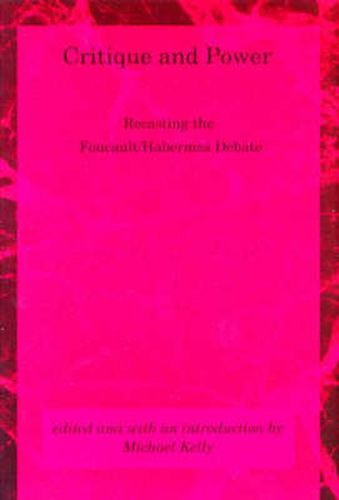Readings Newsletter
Become a Readings Member to make your shopping experience even easier.
Sign in or sign up for free!
You’re not far away from qualifying for FREE standard shipping within Australia
You’ve qualified for FREE standard shipping within Australia
The cart is loading…






Which paradigm of critique - Foucault’s or Habermas’s - is philosophically and practically superior, especially with regard to the nature and role of power in contemporary society? This collection addresses this question in relation to the ethical, political and social theory of the past two decades. Michel Foucault and Juergen Habermas had only just begun to come to terms with one another’s work when Foucault died in 1984; they had even discussed the possibility of a formal debate on Enlightenment in the neutral arena of the US. In the decade since, Habermas and his supporters have continued to respond to Foucault in various ways, but Foucault’s followers have not shown as strong an inclination to keep up his side of the dialogue. For this reason an invaluable exchange on the nature and limits of philosophy in the present age has never achieved its full potential. This anthology recasts the debate in a way that will open it up for further development. The book starts by juxtaposing key texts from the two philosophers; it then adds a set of reactions and commentaries by theorists who have taken up the two alternative approaches to power and critique. Two of these essays were written especially for this volume. The result is a guide for those seeking to understand and build on this debate. The book contains essays by: Michel Foucault; Juergen Habermas; Axel Honneth; Nancy Fraser; Richard Bernstein; Thomas McCarthy; James Schmidt and Thomas E. Wartenberg; Gilles Deleuze; Jana Sawicki; and Michael Kelly.
$9.00 standard shipping within Australia
FREE standard shipping within Australia for orders over $100.00
Express & International shipping calculated at checkout
Which paradigm of critique - Foucault’s or Habermas’s - is philosophically and practically superior, especially with regard to the nature and role of power in contemporary society? This collection addresses this question in relation to the ethical, political and social theory of the past two decades. Michel Foucault and Juergen Habermas had only just begun to come to terms with one another’s work when Foucault died in 1984; they had even discussed the possibility of a formal debate on Enlightenment in the neutral arena of the US. In the decade since, Habermas and his supporters have continued to respond to Foucault in various ways, but Foucault’s followers have not shown as strong an inclination to keep up his side of the dialogue. For this reason an invaluable exchange on the nature and limits of philosophy in the present age has never achieved its full potential. This anthology recasts the debate in a way that will open it up for further development. The book starts by juxtaposing key texts from the two philosophers; it then adds a set of reactions and commentaries by theorists who have taken up the two alternative approaches to power and critique. Two of these essays were written especially for this volume. The result is a guide for those seeking to understand and build on this debate. The book contains essays by: Michel Foucault; Juergen Habermas; Axel Honneth; Nancy Fraser; Richard Bernstein; Thomas McCarthy; James Schmidt and Thomas E. Wartenberg; Gilles Deleuze; Jana Sawicki; and Michael Kelly.